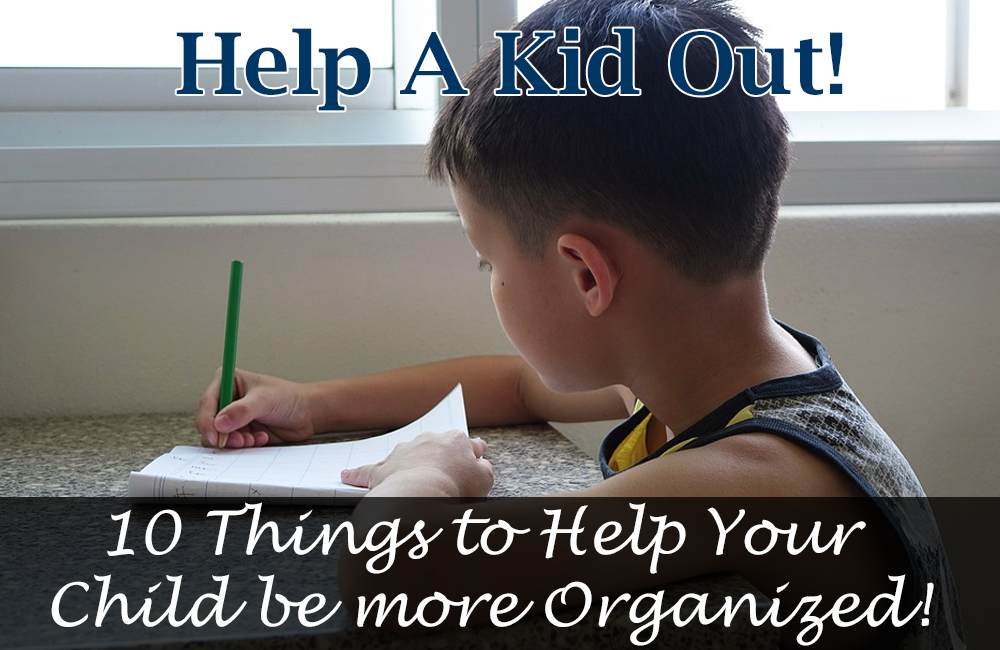Help a kid out!
Organization and time management skills are just that skills. A talent is something you possess (like being musical or athletic) but a skill is something you learn and practice (like playing an instrument or making a basket). Skills are teachable so teach them to your kids. There is just some knowledge that kids don’t get at school. Nowhere in the Colorado Statement Standards will you find organizational skills or time management skills. You will find apply thinking skills to a specific subject but that is hard to do if you are completely disorganized. Your kids are already watching you to learn; so be a good role model.

Help a kid out! Here are ten things you can do to help:
- Have a family calendar- this calendar will allow your kids know what is next and make him think about the future which is important in developing time management skills. It can be in a home management binder, on a phone or on the refrigerator depending on your kids age and your family’s lifestyle.
- Chores and cooking- yes your kid only has one childhood so you don’t want him working all the time but you want him to learn responsibility, how do plan and value that everyone in a family is needed to make the family run. Chores for younger kids will be simple like throwing away a dirty diaper for a 2-year-old to cleaning a room for a teenager. Chores with sorting in involved are great for developing executive function skills for young children. My kids started sorting their laundry at age three into colors and whites.
- Conduct nightly and weekly pick-ups- Every night before dinner, as part of the bedtime routine or whenever it will fit so that it is consistent do 5-15 minutes of putting stuff back where it goes. For school aged kids add a Friday, clean out of the backpack. Find the papers you need to sign, homework that may have gotten lost, PE clothes that need to be washed and whatever else may be lurking in the depths of the backpack.
- Get ready the night before-Lunches packed for the night day, clothes laid out, backpack prepared. Rarely have I ever packed a lunch for my kids, even as kindergartens. I don’t mean let them pack whatever they want. I started out by being in the room to help or advise with statement like “don’t forget your drink” or “how about some fruit.”
- Checklists- Yes, please. Don’t want to say pick up your toys 500 times in a day. Checklist make expectations clear and most people grow you using to-do list which are the same thing. Keep them short younger kids maybe even with pictures but by high school they should be making their own.
- Homework- Three things need to be paid attention to here. First: a space where your child is comfortable doing homework. It may be on top of a made bed with a lap desk, the kitchen table, the floor, a desk but it really needs to be their choice. Secondly; supplies need to be fully stocked and accessible to them. Third: homework should be done at a time when he or she has the energy to do it. Right after school doesn’t work for every kid. Some have more energy after dinner or after a sports practice. If it is taking them too long, odd are they are trying to do it at a time when they don’t have enough energy.
- Set time limits: And use a time to enforce them. Whether it is how much time to spend on a video game, watch TV or do homework. Time limits are important to help kids learn to transition from one activity to another.
- Spell it out: Sometime what adults do and why just isn’t clear to kids. Explain your expectations or rationale to them. They may roll their eyes depending on their age but at least they will know why.
- Planner: Middle schoolers and high schoolers need a planner. Some schools provide them and some don’t. Most school planners only provide enough space for their classes but not the rest of their life. Kids are busy today. Get them a grid style planner where they can see a whole week at one time and that goes into the evening so they can plan their life not just school. Paper is preferred for students with executive function issues in particular but if you have a really techy kid a digital one may work.
- Reward and support: Reward them what they are doing well and support them where they need help. Skills take time to build. If they are doing it 80% of the time; that is a success.

Big Bang Coaching, LLC provides coaching for the neurodiverse.




